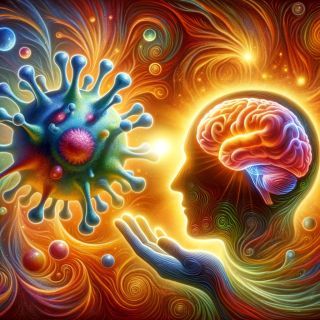Neuroscience
Could Viruses Help to Protect Your Brain?
Recent research has profound implications for neuroscience and brain health.
Posted February 26, 2024 Reviewed by Gary Drevitch
Key points
- Viruses are increasingly recognized for their role in brain health.
- Viral infections can cause major brain issues, but research suggests the potentially positive effects as well.
- The gut "virome" is emerging as an important link between viruses and disease states.
- Research suggests that knowing the viruses in our brains may help us understand cognitive disease risk.

In recent years, we’ve heard a lot about the health risks of viruses and how they may negatively impact the brain. This amplifies the existing theme of viruses being described as germs or “pathogens"—meaning they’re dangerous to our health. But the truth is that the story of viruses is much more nuanced. And now we’re learning that viruses may play a far larger role in our brain health than we ever imagined. Here’s the science and what it may mean for the future of brain health.
Known links between viral infections and brain disorders
Many viruses are known to cause brain diseases in humans. Some viruses cause rapid rises in inflammation of the brain and surrounding structures. Examples include the Zika virus, dengue, polio, measles, herpes, and rabies.
Other viruses are believed to smolder for decades, increasing inflammation at much lower levels and increasing the odds of developing chronic brain diseases. Herpes viruses are perhaps the best example: Chronic herpes infections are linked to brain issues ranging from the development of multiple sclerosis to dementia.
Our DNA is packed with codes from old viruses
One of the most amazing things about viruses is their ability to take over our cellular machinery for their own benefit. Viruses are incredibly small; to replicate, they rely on our cells to produce copies of themselves. In the process, viruses leave behind programming that can be incorporated into our genes. In fact, research suggests that our genes are up to 8% viral, and that this ancient virus data may be a key to our survival. An eye-opening study just published in the journal Cell found that a bit of leftover virus genetic code is key to the production of myelin (a critical component of our brains).
The gut virome speaks to the brain
We’ve all heard about the “gut microbiome” by now. But did you know that in addition to the trillions of bacteria in your gut, you also have up to 10 times as many viruses? The gut “virome” is colonized starting at birth, shaped by diet and unique to each person. While the data is early, there’s research suggesting that alterations in the gut virome may impact the brain. One way is by effects on known risk factors for brain disease, including diabetes, obesity, and liver disease. Fascinating research just published also found that transplanting the gut virome from stress-free mice into stressed mice protected against stress-related changes in the brain.
The brain has its own virome
We’ve known for some time that viruses can exist and persist in the brain. But new research suggests that the makeup of the viruses in our brain may relate to conditions like mental health diagnoses. In a 2023 study, researchers found that the brain viromes of people with schizophrenia were different than healthy controls. They concluded, “Brain virome dysbiosis may be associated with mental illness, and viral signatures may serve as biomarkers for the early detection of schizophrenia.”
Where we go next
Currently, most of the existing science focuses on the overall negative effect from viruses on our brain function, and clearly there is a basis for this perspective. This is especially the case for viruses that cause an intense inflammatory state in the brain, or those that can survive for decades. But it’s likely that in the years to come, we’ll be looking at the benefits from cultivating certain viruses in our gut, and potentially even in our brains. The shift in perspective is likely to mirror what’s already happened with the bacterial microbiome and may have profound implications for the future of brain health within the domains of psychology, neurology, gastroenterology, and neuroscience.


